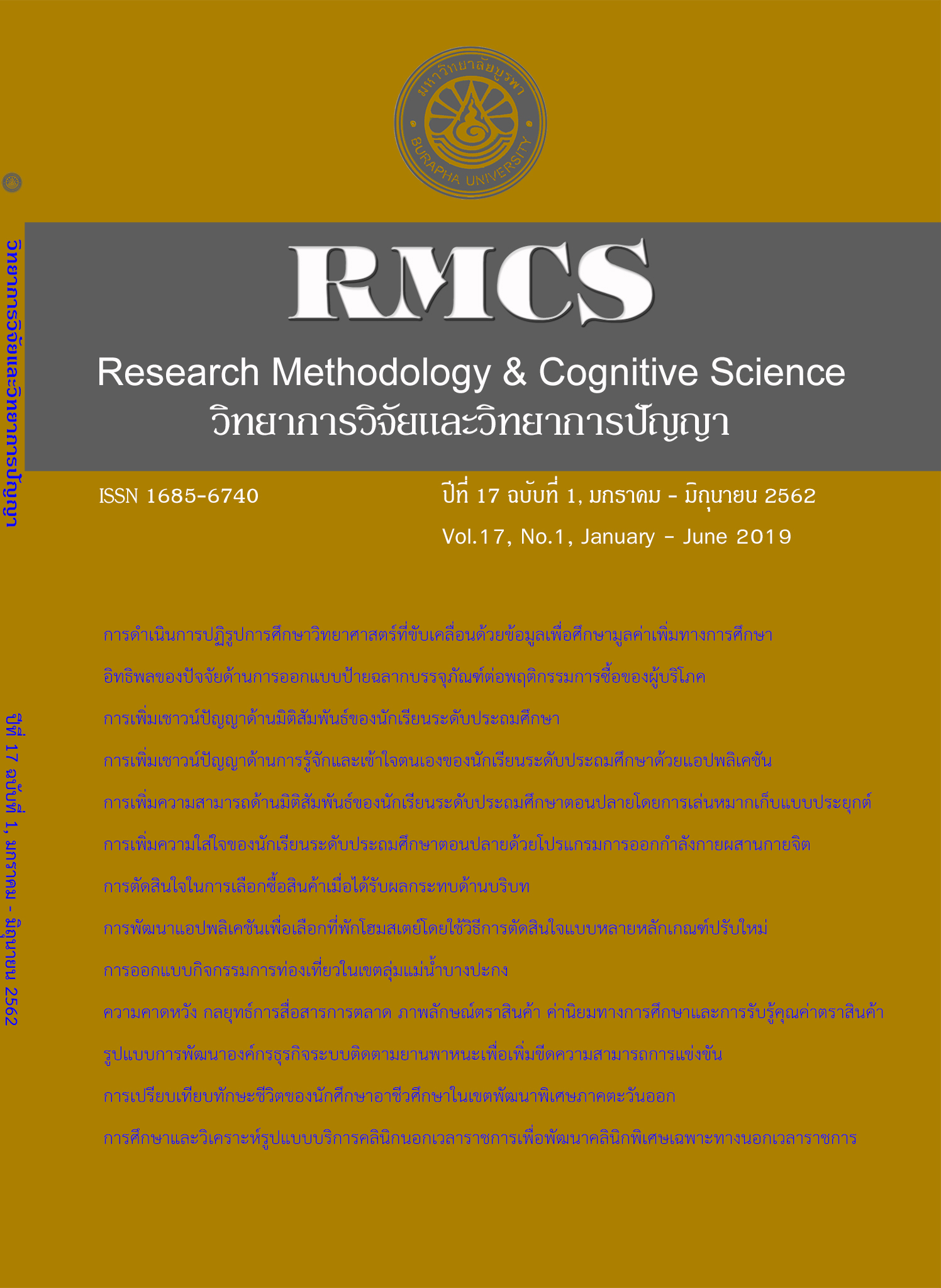Vehicle Tracking System Business Organization Development Model for Enhancing the Competitiveness
Main Article Content
Abstract
This research aims to create a business organization development model ofvehicle tracking system to increase competitiveness. Qualitative research with Delphi techniques from 17 experts was used. The first round was conducted to ask for synthesizing the possible issues, then a questionnaire was created. The second round was conducted to allow the experts to provide feedback on appropriate issues and on the possibility to use in a real setting. The third round was run for the expert to confirm their provided feedback and to find a consensus by using Median, Inter-quartile rang, and coefficient of dispersion. These statistics led to a summary of the criteria and to implement it with companies via participatory action and AIC creation process for evaluating the pattern of six elements and 30 indicators. The given elements and indicators were used to compare Mean, Feasibility standards, Standard of usefulness, Standard of Suitability, and Comprehensive accuracy standards.
Article Details
References
กองบริหารงานวิจัยและประกันคุณภาพการศึกษา. (2560). Thailand 4.0 โมเดลขับเคลื่อนประเทศไทยสู่ความมั่งคั่ง มั่นคง และยั่งยืน. (2559). เข้าถึงได้จาก http://bps.moph.go.th/new_bps/sites/default/files /Thailand%204.0_050160%20%282%29.pdf
ธารณี อภัยโรจน์. (2554). การศึกษาสมรรถนะหลักเพื่อการพัฒนาบุคลากร: กรณีศึกษาสำนกงานอธิการบดี มหาวิทยาลัยมหิดล วิทยาเขตศาลายา. วารสารบริการ, 22(1), 59-72.
พุทธิ ผาสุข. (2560). GPS ช่วยลดอุบัติเหตุบนท้องถนน ญี่ปุ่นต้นแบบสร้างถนนปลอดภัย. เข้าถึงได้จาก https://www.grandprix.co.th/gps
บุญชม ศรีสะอาด. (2554). การวิจัยเบื้องต้น (พิมพ์ครั้งที่ 9). กรุงเทพฯ: สุริวิทยาสาส์น.
วิลาวรรณ รพีพิศาล. (2554). ความรู้พื้นฐานในการบริหารทรัพยากรมนุษย์ในการบริหารทรัพยากรมนุษย์. กรุงเทพฯ: โรงพิมพ์ วิจิตรหัตถกร.
ศศิประภา ชัยประสิทธิ์. (2553). องค์กรแห่งนวัตกรรมทางเลือกของผู้ประกอบการยุคใหม่. วารสารนักการบริหาร, 30(2), 60-63.
สุริมล ว่องวานิช. (2549). การวิจัยปฎิบัติการในชั้นเรียน. กรุงเทพฯ: สำนักพิมพ์แห่งจุฬาลงกรณ์มหาวิทยาลัย.
อนิวัช แก้วจำนง. (2555). การจัดการเชิงกลยุทธ์ (Strategic Managent) (พิมพ์ครั้งที่ 2). สงขลา: ศูนย์หนังสือมหาวิทยาลัยทักษิณ.
Barney, J. (1991). Firm Resources and Sustained Competitive Advantage. Journal of Management, 7(1), 99-120.
Bedeian, A. B., & Zammuto, R. (1991). Organizations: Theory and design. New York: The Dryden Press.
Drucker, P. K. (1999). Knowledge-worker Productivity: The Biggest Challenge. California Review Management, 41(2), 79-94.
Ghasemkhani, H., Soule, D., & Westerman, G. (2014). Competitive Advantage in a Digital World: Toward An Information-Based View of the Firm. Retrieved From http://ssrn.com/abstract=2698775
Kaewthep, K., & Chaikunpon, N. (2012). New medias study manual. Bangkok: Metheevijai Awarded Project, The Office of Thailand Research Fund.
Kotler, K., Wong, V., Saunders, J., & Armstrong, G. (2005). Principles of Marketing. Retrieved From www.pearsoned.co.uk.
Krasnikov, A., Jayachandran, S., & Kumar, V. (2009). The Impact of Customer Relationship Management Implementation on Cost and Profit Efficiencies: Evidence from the U.S. Commercial Banking Industry. Journal of Marketing, 73, 61–76.
Maijoor. S, & Witteloostuijn, A. V. (1996). An Empirical Test of The Resource-Based Theory: Strategic Regulation in The Dutch Audit Industry Strategic. Management Journal, 17, 549-569.
Nuthall, P.L. (2006). Determining the Important Management skill Compeatencies. The case of Family Farm Business in New Zealand. Agricultural Systems 88, 429-450.
Porter, M. E. (1985). Competitive Advantage. New York: The Free Press.
Porter, M. E. (2008). The five competitive forces that shape strategy. Harvard business review, 86(1), 25-40.
Senge, P. M. (1990). The Fifth Discipline: The Art and Practice of the Learning Organization. New York: Doubleday.
Supitchayangkool, S., Wongkhomthong, S. and Kiewkarnka, B. (2014). The components of knowledge management in community hospital administration under office of permanent secretary of Ministry of Public Health. Journal of Business, Economics and Communications, 9(2), 98-107.
Tragoolsrid, V. (2006). Teamwork. Bangkok: Soon Songserm Vichakarn.
Teeravarapich, S. (2005). Team learning for organization development. Human Resource Development Journal, 1(1), 257-275.

